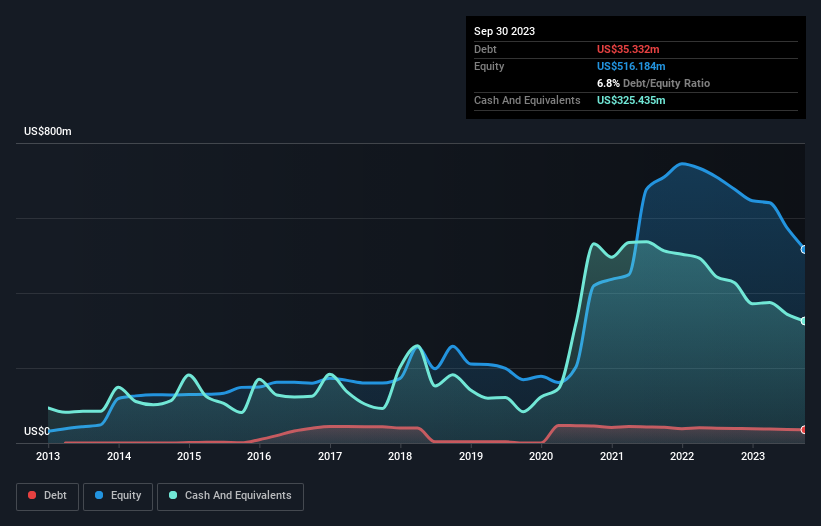Warren Buffett famously said, 'Volatility is far from synonymous with risk.' When we think about how risky a company is, we always like to look at its use of debt, since debt overload can lead to ruin. As with many other companies Overstock.com, Inc. (NASDAQ:OSTK) makes use of debt. But the real question is whether this debt is making the company risky.
When Is Debt A Problem?
Debt and other liabilities become risky for a business when it cannot easily fulfill those obligations, either with free cash flow or by raising capital at an attractive price. Ultimately, if the company can't fulfill its legal obligations to repay debt, shareholders could walk away with nothing. While that is not too common, we often do see indebted companies permanently diluting shareholders because lenders force them to raise capital at a distressed price. Having said that, the most common situation is where a company manages its debt reasonably well - and to its own advantage. When we think about a company's use of debt, we first look at cash and debt together.
Check out our latest analysis for Overstock.com
How Much Debt Does Overstock.com Carry?
As you can see below, Overstock.com had US$35.3m of debt at September 2023, down from US$38.8m a year prior. However, its balance sheet shows it holds US$325.4m in cash, so it actually has US$290.1m net cash.

How Healthy Is Overstock.com's Balance Sheet?
Zooming in on the latest balance sheet data, we can see that Overstock.com had liabilities of US$209.4m due within 12 months and liabilities of US$45.2m due beyond that. On the other hand, it had cash of US$325.4m and US$19.6m worth of receivables due within a year. So it can boast US$90.4m more liquid assets than total liabilities.
This short term liquidity is a sign that Overstock.com could probably pay off its debt with ease, as its balance sheet is far from stretched. Succinctly put, Overstock.com boasts net cash, so it's fair to say it does not have a heavy debt load! The balance sheet is clearly the area to focus on when you are analysing debt. But ultimately the future profitability of the business will decide if Overstock.com can strengthen its balance sheet over time. So if you want to see what the professionals think, you might find this free report on analyst profit forecasts to be interesting.
In the last year Overstock.com had a loss before interest and tax, and actually shrunk its revenue by 26%, to US$1.6b. That makes us nervous, to say the least.
So How Risky Is Overstock.com?
Statistically speaking companies that lose money are riskier than those that make money. And the fact is that over the last twelve months Overstock.com lost money at the earnings before interest and tax (EBIT) line. And over the same period it saw negative free cash outflow of US$69m and booked a US$164m accounting loss. However, it has net cash of US$290.1m, so it has a bit of time before it will need more capital. Even though its balance sheet seems sufficiently liquid, debt always makes us a little nervous if a company doesn't produce free cash flow regularly. The balance sheet is clearly the area to focus on when you are analysing debt. However, not all investment risk resides within the balance sheet - far from it. For instance, we've identified 2 warning signs for Overstock.com that you should be aware of.
If, after all that, you're more interested in a fast growing company with a rock-solid balance sheet, then check out our list of net cash growth stocks without delay.
Valuation is complex, but we're here to simplify it.
Discover if Bed Bath & Beyond might be undervalued or overvalued with our detailed analysis, featuring fair value estimates, potential risks, dividends, insider trades, and its financial condition.
Access Free AnalysisHave feedback on this article? Concerned about the content? Get in touch with us directly. Alternatively, email editorial-team (at) simplywallst.com.
This article by Simply Wall St is general in nature. We provide commentary based on historical data and analyst forecasts only using an unbiased methodology and our articles are not intended to be financial advice. It does not constitute a recommendation to buy or sell any stock, and does not take account of your objectives, or your financial situation. We aim to bring you long-term focused analysis driven by fundamental data. Note that our analysis may not factor in the latest price-sensitive company announcements or qualitative material. Simply Wall St has no position in any stocks mentioned.
About NYSE:BBBY
Bed Bath & Beyond
Operates as an e-commerce affinity marketing company in the United States and Canada.
Good value with adequate balance sheet.
Similar Companies
Market Insights
Community Narratives





